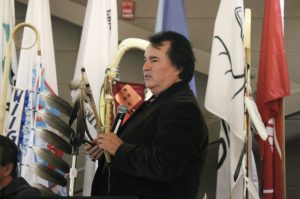Anishinabek Nation Chiefs seek to move governance ratification vote to late 2019

By Marci Becking
LITTLE CURRENT – Anishinabek Nation Chiefs-in-Assembly met in Little Current on November 14-15 and have directed the Restoration of Jurisdiction department at the Anishinabek Nation to engage the federal government to extend the ratification vote for the Anishinabek Nation Governance Agreement to November 2019.
Since 1995, the Anishinabek Nation has engaged in governance negotiations with the federal government as mandated by resolution #95-25. Since the passing of this resolution 23 years ago, there have been many positive changes in member First Nations that have taken place as some First Nations within the Anishinabek Nation are already doing their own best practices in governance and do not want to compromise their own governance.
Prior to this assembly, the federal government had targeted July 2019 for the ratification of the Anishinabek Nation Governance Agreement by Anishinabek Nation citizens, primarily to fit into their federal election timelines.
The Anishinabek Chiefs-in-Assembly expressed concerns over potential impacts that the Governance Agreement may have on current and future agreements that may have not been sufficiently assessed and have requested that the vote date for the Anishinabek Nation Governance Agreement be extended in order to allow more time to consult with the Anishinabek citizens.
Angus Toulouse, a councillor with Sagamok Anishnawbek, Serpent River First Nation Chief Elaine Johnston and Sheguiandah First Nation Chief Andrew Aguonie spoke out about the approach with Canada.
“We talk about the Ngo Dwe Waangizid Anishinaabe and this approach with Canada does not address what our responsibilities to our peoples [are],” said Toulouse. “This suggests that we’re going to set aside our treaty and forage ahead with a new organization that would be our government that would bring us together to fight over the little bit of resources that the government will allow us to fight over. We need to reconcile how [we as 1850 people] are going to live and benefit from the resources of the land. As Robinson Huron treaty people, we are forcing the discussion with the annuity claim.”
Chief Johnston says that she feels that she is not being heard.
“I have my Eagle Feather with me. There have been a lot of changes since this agreement happened. We had our own governments and our natural laws. We already had our own governments,” said Chief Johnston. “To our people: Is the Union of Ontario Indians our government? No. Anishinabek Nation is bigger than the 40 First Nations. It goes into the U.S. and Manitoba. We had this discussion about relationships in our Lake Huron meeting. We have concerns about Restoration of Jurisdiction. I believe that there is a role for the UOI – it is an advocacy organization. It needs to open the door and get out of the way for us to have dialogues. The government likes to pit us against each other. They like that we work in these little silos. They don’t have to recognize us as individual First Nations. Our people have the inherent right – [it] does not belong at the UOI, it belongs at home. You can’t talk about governance without talking about land. The UOI doesn’t understand. We are working on governance, citizenship and constitution. We are not on your list. This is my concern to that. Times have changed since 1995. One of the things we said – we are moving fast and seems to be according to government timelines. Why are we following government timelines?”
Chief Aguonie said that when you say the treaties aren’t a part of this, you are right.
“[The treaty relationship] was supposed to be a brother/sister relationship with the Crown, not paternal. The Crown took that upon themselves,” said Chief Aguonie. “They have never conquered us—constitutions are under Canadian framework. Natural law – our constitutions are our Pipes when we decided something about life. I can talk about the beginning of time and that history – the way we viewed competition. The bottom line is that’s what we need to govern ourselves. The Canadian government will never acknowledge our natural law. I feel like if we are going to do something new, it has to be about the land, the government and stewardship. If there is no land, there is no life. It is hard to live on our postage stamps. When people talk about climate adaption, they should talk about fixing it up.”
The Anishinabek Nation anticipates the completion of the governance negotiations by December 2018.
Martin Bayer, Chief Negotiator for the Anishinabek Nation on the governance negotiations, explained that these negotiations are not about treaties because the Chiefs never wanted the negotiations to be about treaties when they mandated these negotiations.
“We are following the mandate we were given by the Chiefs and doing the work we were asked to do by you,” Bayer explained.
Bayer also noted that the inherent right of self-government of the First Nations is already recognized in the Anishinabek Nation Governance Agreement.

